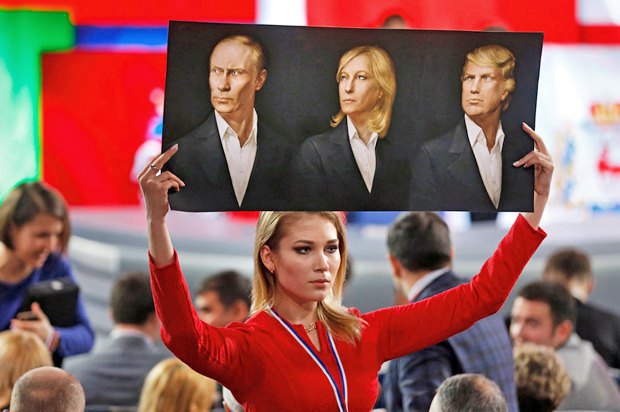
The struggle for bases and positions in the Eastern Mediterranean and the Middle East, which I talked about previously, gave "perfect results": millions of refugees escaping a civil war and barbarian carpet bombing by the Russian Aerospace Troops flooded European countries which turned unprepared for this development of events both morally, politically and organizationally. The question of how refugees should be treated split the European society and gave significant dividends those political forces who declare so-called traditional values. Namely these parties Russia sees as its potential allies in the fight against the US global role in the "multipolar world".
It should be noted that European conservative nationalist forces are rather heterogeneous. One cannot say confidently they like Russia. Rather they have certain affection for its leader Vladimir Putin. It is quite for a person living in Russia to understand the mechanism of such affection. From conversations with European experts one can assume that the "Putinism" of right-wing nationalists in Europe is based on denying certain traits of the global liberal model. This affection is based on anti-Americanism closely connected to anti-Semitism (because it is Jewish capital that is seen as the main locomotive of globalisation , which includes the "departure" of industrial enterprises together with jobs in the "real economy" to the countries which used to be the third world recently; unemployment, prioritising of interests of large banks, and the rule of international financial speculative capital).
Homophobia played an important role: Russia positions itself as a country declaring traditional family values. The horrifying ethic of the Russian society remains out of sight for those who have never visited the country, do not speak the Russian language and are far from internal information flows in the Russian press and on TV. Irritation with same-sex marriages, programmes of "gender-tolerant" upbringing of children and teenagers in the European society is all there.
Finally, they also see Putin as a strong leader whose will is determinant to all processes happening in this huge country. The fact that with each year, this country loses controllability in the most important issues, is deep in corruption and arbitrariness on all levels of power, while poverty and property segregation have reached the scale which is unimaginable for average Europeans – this fact remains unnoticed and incomprehensible for them. After all, RT (Russia Today) gives an absolutely opposite picture of life in Russia while "proper" journalists speak about violations of abstract democracy and rights of minorities which have not made European laymen particularly sympathetic either.
Compared with the EU's horizontally integrated management structure with its heavily bureaucratized system of decision making, the Russian vertical power looks like a paragon of efficiency and "triumph of will". Let us remember how ecstatic European intellectuals were about Joseph Stalin, which only changed after they heard Andrey Sakharov's speeches and read The Gulag Archipelago.
There is one thing, however, which Moscow does not understand. Traditionalism and nationalism, various sorts of "going back to roots" in nearly every important European and non-European country (here I'm talking about Japan and, to a large extent, about Turkey) cannot objectively obstruct Russophobia.
We can only say that the only way to reconcile the West and Russia is through the "lack of historical memory", destruction of traditional links between the generations, multiculturalism and full national and cultural tolerance. The civilization and cultural code of the West and Russia are so diametrically opposed that the revival of traditional national values there does not bode well for Russia at all.
Had the Kremlin politicians and experts been qualified enough, they would have already detected these signals in the post-Soviet space. We can see the early signs of traditional national revival in Belarus and Kazakhstan. They would have been more visible in Central Asia had it not felt the need to flirt with Russia to avoid being fully absorbed by China.
I think that in the near future, we will be able to witness a rather interesting evolution of views on the part of Donald Trump and his allies. Thinking that by nourishing the Alternative for Germany or Marine Le Pen with money, Russia will be able to ensure allies for itself in Western Europe means you have absolutely no idea about the essence of the European civilization and history. They will surely accept money but they are unlikely to become long-term and reliable partners. One can hardly think that European right-wing forces are as naïve as to keep a long trust in RT's demagoguery which hides the indisputable fact that the waves of migration by cultural and racial aliens, to fight which they received their mandates of power, were provoked by the Kremlin's subversive policy. It is quite possible that they already understand this but keep silent waiting for promised money.
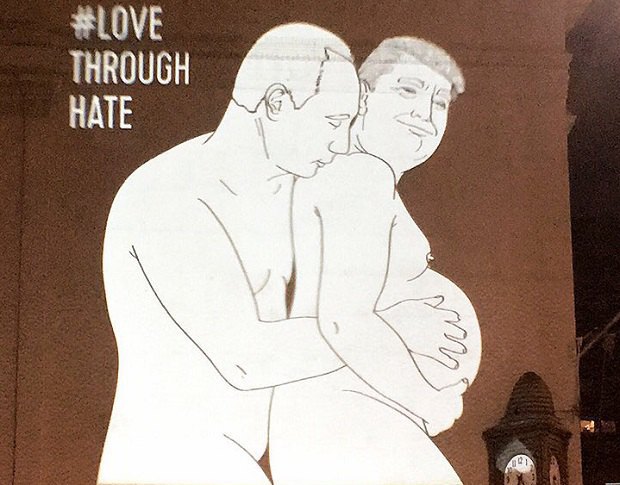
Still, the Kremlin is planning to win anyway. If the "liberals" headed by Merkel remain in power, criticism against them will continue. If the nationalists from the Alternative for Germany win, Moscow will immediately start speaking about a wave of neo-fascism engulfing Europe and will offer the "liberals" to cooperate in fight against fascism like they are now offering them to join forces in fighting terrorism. So Russian ideologists and propagandists are not at risk under any scenario.
Trojan horses
Rather primitive methods of work by the special services have replaced Russia's long-term foreign policy strategy.
It is commonly known that the most important foreign policy decisions are taken by the Security Council consisting of "former" employees of the KGB/FSB, the Foreign Intelligence Service and so on. These employees would not be themselves had they lost a chance to use the migration waves from the Middle East to Europe to plant their agents. Russia has a perfect human resource for this, which is Chechens.
When Russia was cracking down on the freedom fight in Inchkeria, Europe received the activists of the rebellion and granted them shelter. After Ramzan Kadyrov imposed his dictatorship of "constitutional order" on the republic, anyone who stood for independent Ichkeria and could resist the dictatorship were harshly persecuted. The special services leaped at the chance by massively (as for a small-sized republic) issuing passports for foreign travel and reports saying this or that person is being persecuted in their native land. Thus, together with true political emigrants, crowds of young and healthy Chechen men rushed to Europe, Turkey and the Middle East. Considering their clan traditions, big families and Chechens' close family links, it is easy hold these agents "on the hook", because their near and dear back home are like hostages in the dictator's hands.
Chechen "refugees" who came to European countries had no problem adapting and building contacts with Muslim communities, including those of clearly terrorist nature. Those who had had military training (there were plenty of them after the long war in Chechnya) were especially welcome guests.
This way Russia is "killing two hairs at once", it now has informers and agents of influence in the aggressive Muslim environment and a tool of influence on the Islamic terrorist underground.
That is why big terrorist acts in Europe surprisingly happened a day or two before large summits and talks where incessant calls to join forces with Russia in fighting a "common terror threat" were made. Is "such an insignificant concession as the recognition of occupied Crimea as a truly Russian territory and preparedness to help the Kremlin 'keep the face'" such a big payment for one's own security?
This thesis contains the answer to two more questions.
The first one is what can Russia contribute to fight against terrorism? Obviously, if the conditions are right for recognizing the equal rights and multipolar world, Moscow will simply "turn" its agents and "terrorist chieftains" in to western special services. Why would anyone feel pity? Russia could set up an identical one in less than a year!
And the second issue is why do the Russian Aerospace Troops bomb Syria but terrorist acts happen in Nice, Munich, Berlin, Brussels, Paris and so on? That is because the agents of influence tell their "brothers in faith" that, first, the traditional Russian Orthodoxy is friendly to Islam (unlike the Catholic and especially Lutheran churches – I think everyone remembers this conceptual statement by patriarch Gundyayev). Second, they tell them that now Moscow supports Shiite terrorist organizations but as a "friend of all oppressed by American imperialism and cursed globalism" Muslims and people of the East it is ready to support, in principle, similar Sunni organizations too. And at FSB board meetings, they happily report to the president about their effective fight against the threat of terrorism, receiving additional funding, ranks and awards.
It is obvious that similar activities were carried out by the natives of Chechnya and Asian territories vassal to the Kremlin, who, after they were issued Russian passports for foreign travel, went to the Middle East. It does not make much difference whether they went to fight for Syria's Bashar al-Assad or for Islamic State.
That is why Russia's representatives never said that the main strategic means of fight against terrorism is, above all, maximal individualization, depatriarchalization and secularization of the life and conscience of peoples whose level of development is typical of pre-Renaissance Middle Age. For this, first and foremost, all these "liberal" values and principles, which evokes so much hate on the part of the Kremlin and the Moscow-run Russian Orthodox Church and Islamic traditionalists, should be planted in this environment by all means.
Opportunistic and subversive policy in Europe
Russia now does not shun blatant preparations for coups d'etat in European countries.
One of the striking misunderstandings about the Russian expert political thinking is the belief that there are people, public and social groups and entire states "loving" Russia. Thus it can rely on them in its provocative policy.
The belief that Ukrainians are a "brotherly" nation having absolutely no cultural and political subjectness of its own resulted in the global strategic mistakes and unprecedented enmity on both sides of the border.
The beginning of an identical process we are currently witnessing with regard to Belarus.
The Balkans proved to be the biggest failure of Russia's opportunistic and subversive policy in Europe. Russians' confidence in the strength of its positions in this region of Europe was based on the myths dating back to 1877-1914 about their own liberation mission and allegedly infinite historical gratitude from the side of South Slavs.
Bulgaria was the first to distance itself politically from the notional "Russian world". Not only did it join the EU and NATO, but also reached certain economic success. At least, Bulgaria's minimum wage is currently significantly higher than that in Russia.
Apart from the myth about "brotherly" feelings, Russia considers the confessional factor as its leverage. Any country with the predominantly Orthodox population is a priori seen as a potential ally in confrontation with the "morally degrading" West. Experts remember Moscow's unsuccessful attempt to set foot in Greece: so much was said that after winning the election, Alexis Tsipras would make a policy U-turn and become Russia's geostrategic ally! Oh, how many dreams there were about naval bases in Greek Mediterranean harbours! And what? Tsipras comes to Moscow, meets Russian politicians and experts, assuring everyone of eternal friendship and fraternity between the "Greek and Russia nations'. Having understood that it makes no sense to expect Russia to help its economic problems, Greece preserved its Euro-Atlantic course, having left the issues of Orthodox unity and a chance for Putin to visit the Mount Athos exclusively within the framework of the Russian domestic policy.
By all means, Moldova is going the same path now.
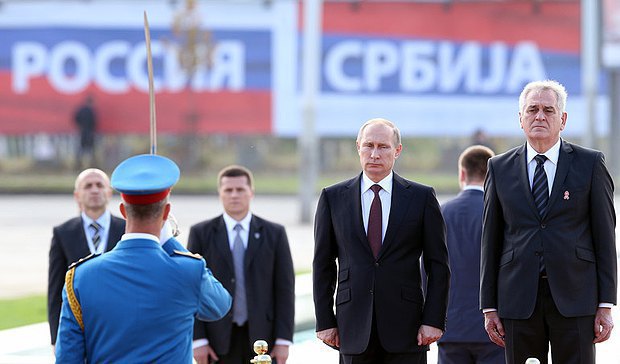
Also, Russia has Serbia. Serb "brothers will not betray", especially since Serbs remember that NATO bombed Belgrade and so they "will neither forgive nor forget". However, Serbs feel offended by Moscow over the absence of support for the Kosovo issue. But the main vector of Serbia's international policy has been defined. And to irritate the Kremlin, this vector is pro-Western: it is bound for the EU and NATO.
Montenegro's foreign policy has been defined to a larger extent. Here we also have a case of the mythologisation of conscience and wishful thinking which played a bad joke with Russian diplomats. First, even without being an expert in the Balkans, one should know that Serbs and Montenegrins are two different nations. And Montenegro is independent, in particular from Serbia. And if Belgrade is in pain making decisions with regard to its accession to the EU and NATO, this has no effect on Podgorica.
Using the motto "We will not let Montenegro leave for NATO", the Kremlin held preparations for a coup d'etat to overthrow the Montenegrin government. In other words, they carried out an act of aggression (albeit a failed one) against a sovereign European state.
A group of saboteurs was preparing to kill the prime minister and seize government buildings during the election. In this case, it is impossible to find any excuses similar to those Russia used in Ukraine – in Montenegro, there was no revolution, neither there was a reason to topple the authorities or recognize them illegitimate.
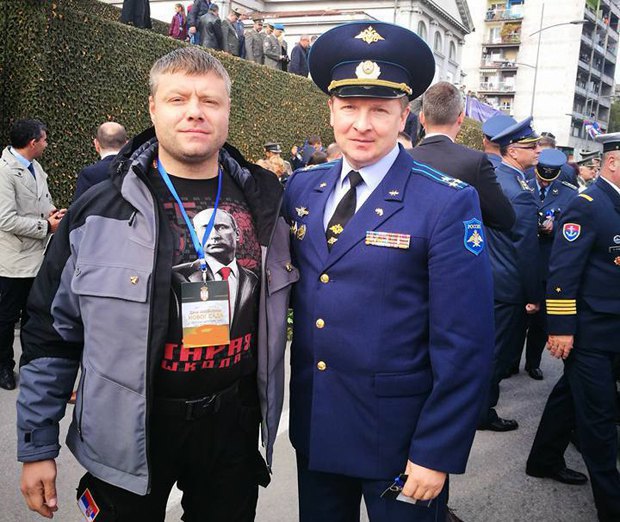
Thus it was an act of state terrorism against Montenegro. It was only diplomatic restraint which forced Montenegrin Prime Minister Duško Markovićto envelope its protest in the "call on Russia and its allies inside the country to stop attempts to destabilize it, resisting the process of its accession to NATO". "Those who warn about riots in the country should keep their hands off Montenegro," he said. The Russian authorities and its media decided to simply hush this foreign policy failure, pretending they had nothing to do with what happened.
Terrorism of new generation
Defence Minister Sergey Shoygu recently acknowledged that Russia is creating information operation troops and promised that they would be stronger than the department currently doing counterpropaganda.
When it comes to counterpropaganda, everything is clear because the level of Russian propagandists and political experts is well known. However in this case the head of the Russian military office was in fact talking about preparations for a large-scale aggression in the information space, essentially about cyber terrorism.
Read: FSB and hackers. What we need to know about a cyber spying scandal
Estonian ex-President Toomas Hendrik Ilves said that "Russian cyber attacks seeking to influence the elections in Europe by the pattern used during the US presidential campaign is an issue of trans-Atlantic security". An investigative into the cyber interference in the US presidential election campaign has only started and will gradually gain momentum. People who allegedly shared information on the matter with US special services and media were arrested in Russia on charges of high treason. Moscow is in rush because there are elections in the key EU states – Germany and France – at stake. They cannot do without the Kremlin's involvement.

The Netherlands, Germany, France, the Czech Republic, Italy and Finland are concerned about a threat of Russian cyber attacks… Each of these countries witnessed the use of the same tools which were used against the USA: hacking attacks by Russia, fake news like "crucified boys" and "savagely raped girls". These news reports are designed to undermine the foundations of the European society and strengthen the positions of politicians whom the Kremlin considers to be pro-Russian. The German intelligence and authorities have registered a sharp increase in Russian propaganda, cyber espionage and misinformation campaigns ahead of the federal elections. France is getting ready to repel cyber attacks in favour of Marine Le Pen. Italy says similar means were used in 2016 to discredit the foreign minister.
How to get protected from Russia?
Hence the question: how should the civilized world react to threats posed by Russia? The answer was partially formulated at the NATO summit in Warsaw in the summer 2016 and at the recent Munich conference, in the speeches by US Vice-President Mike Pence and the president's national security adviser, Herbert McMaster. The international political establishment grows increasingly aware of a global terror threat emanated by Russia.
Unfortunately, the Western expert community is significantly lagging behind in this issue. Experts continue making calls "to hear and understand Russia", not to corner it, let Putin keep the face and so on.
A former US ambassador to Moscow, Michael McFaul, summed up the current stage in international relations as a "return to the reality of a cold war". However, according to the US diplomat, there is a significant difference between the cold war between the democratic West and the Soviet totalitarianism and the current confrontation with Russia in that the former was based on the ideological fight between the two completely different systems. There is no such ideological component now because Russia has lost the Socialist potential of the Soviet times.
The anti-Soviet ideology indeed went down in history and can no longer be used even as a source of experience in new conditions of the information war against Russia. Modern Russia has almost no ideology at all the way it was understood in the Soviet Union. But it has other sensitive ideological soft spots which should be targeted during information attacks.
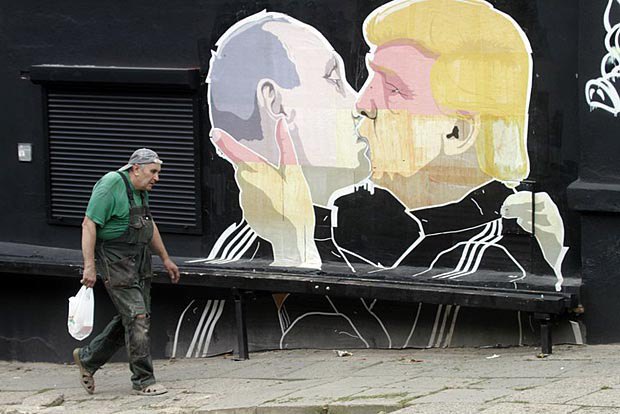
"Russophobia" must replace "anti-Sovietism". The only thing is that Russophobia is neither the feeling of hatred nor fear of Russia but the integral system of historical and political views. In its foundation is a thesis on the pervasive unity of the Russian historical path from the Moscow tsardom to these days, about the dead end of the Russian civilization, its inability to reform and develop itself. The scope of this article is too narrow to be able to discuss this issue in detail but one thing is clear: the Russians have nothing to say in response in fact.
The second thesis, which Russia can hardly counter, is that it is multinational. The national issue largedly contributed to the collapse of two poles of the Russian statehood, the Russian empire in 1917 and the USSR in 1991.
The family curse of the empire, which collated some absolutely different ethnic formations within the single ground borders, which have no other reason to be tied to it but financial, has not been overridden so far.
Finally, a global environment should be formed in which Russia would feel absolutely morally isolated and undesirable. Any politicians or social activists in the West, who declare their affection with Russia or, even more so, their connections to it, must immediately see their careers and public reputation come to an end. Declaring one's liking to Russia (not Putin but Russia) must be seen as the same as denying the Holocaust or expressing public support for nazism. And in this case it does not matter that in one case there was a respective decision of the international tribunal whereas in the other it is not there yet.
One must understand that it is strategically wrong to pour criticism on President Vladimir Putin only, putting all responsibility for the processes described above on him only. Putin is a person and his authority is finite after all. He is just an individual embodiment, product and function of constant traits typical of the Russian civilization as such. The fight against Putin will be over sooner or later and the world will want to believe once again that Russia can become an adequate civilized country after all.
The thing is it won't. The entire history of this country proves it.








